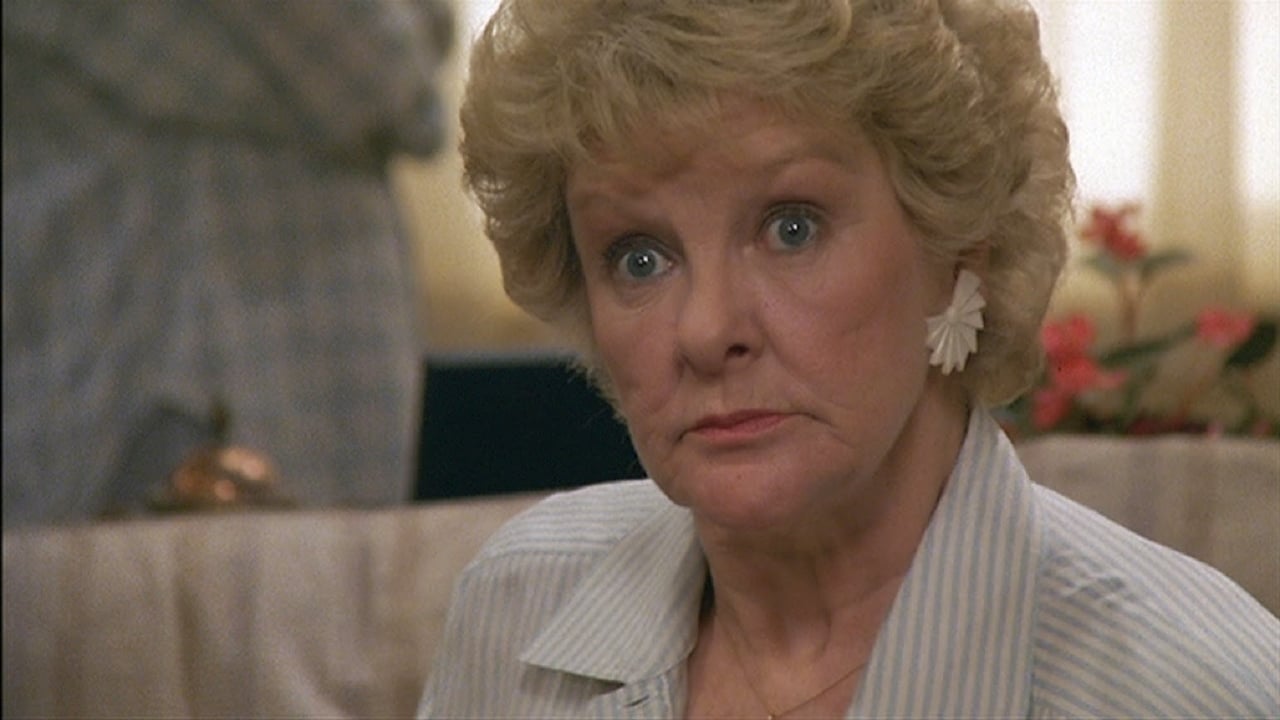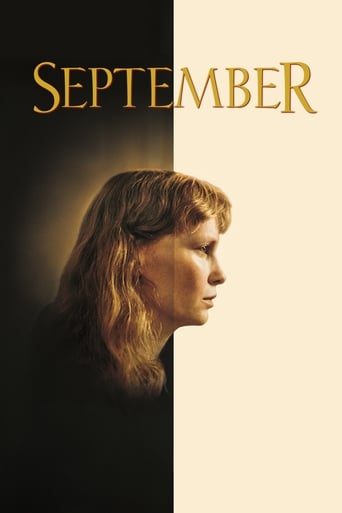

Sadly Over-hyped
... View MoreClever and entertaining enough to recommend even to members of the 1%
... View MoreYour blood may run cold, but you now find yourself pinioned to the story.
... View MoreVery good movie overall, highly recommended. Most of the negative reviews don't have any merit and are all pollitically based. Give this movie a chance at least, and it might give you a different perspective.
... View MoreMia Farrow, Dianne Wiest, Sam Waterston, Elaine Stritch, Denholm Elliott, and Jack Warden make up the cast of Woody Allen's dramatic film September. If you've only seen Woody Allen's comedies, you'll be very surprised by how heavy he can get.Elaine Stritch plays Mia and Dianne's mother, and they make up a typically dysfunctional family, with lots of secrets, resentments, betrayals, and unfortunate love that binds them all together. Mia falls in love with Sam, but Sam becomes infatuated with her sister instead, adding more tension to the mix. The acting in this movie is pretty incredible, but, as is sometimes the case with heavy dramas, it can be tough to watch. This probably won't end up being your favorite movie, but at the very least you'll be able to appreciate the performances. If you're a fan of any of the actors, add this one to your list.
... View MoreEven the most wooden and lifeless Woody Allen film is full of brilliant writing leaving me little to complain about. September by far the most under-whelming of Allen's films I've seen during this retrospective project yet I can easily pull a dozen quote-worthy lines from the film. The 1987 feature of Woody Allen seemed came off uninspired and under- directed. Still, though, Allen addresses a myriad of emotion lying deep below the surface of the individuals involved. Like many Woody Allen films, September involves relationships with partner switching and a healthy dose of heartbreak. September doesn't seem sure what it wants to be about, or if it is sure, its execution is off. What it is sure of is how to subtly convey guarded emotions in a truly beautiful way. That scene closing out the film with the pan of the home and all the memories it contained was simply beautiful.
... View MoreReview: I really found it hard to get into this movie. I found it pretty boring and the concept wasn't that great. Like many other Woody Allen movies, this film is based around troubled relationships and couples falling in and out of love with each other. The 2 best friends who fall in love with the writer who has writers block and the mother and daughter who find it hard to get along, we're uninteresting after a while and they seemed to become a bit annoying because of there constant moaning. I'm also not the biggest fan of Mia Farrow who I find to be quite talentless and miserable in all of her roles, and I got fed up with her constant whining. Anyway, my expectations for this movie wasn't that high so I wasn't surprised with the outcome. I was hoping for something a bit different from Woody Allen, but he just seems to be adamant about telling the same type of stories in most of his movies, Disappointing!Round-Up: OK, I have watched quite a few of Woody Allen movies and I'm slowly finding his films to be about the same thing. I still have quite a few more to watch and I have found a few gems so far but that is mostly from his earlier work or the movies that he doesn't star in. I prefer the movies with Diane Keaton to his work with Mia Farrow and his latter work with some big named stars are pretty impressive, although he does tend to stick to the same concept. I honestly don't think that he will be getting taken seriously until he has decided to stop making films, but I have to admit, the movies that he has made recently have been making quite a lot of money which is why I decided to begin this journey. Budget: N/A Domestic Gross: $487,000 (Terrible!)I recommend his movie to people who are into there Woody Allen movies about a group of friends who are in troubled relationships and question there love for each other. 3/10
... View MoreThis is the film that Woody Allen notoriously shot and then scrapped, re-wrote, re-cast and re-shot, and was reportedly keen to do it a third time. But to be honest, I really wish he'd just left it scrapped. Don't get me wrong, I'm a huge Allen fan, and would sit down to watch anything by him, comedy or drama, and on top of that, I'm also a fan of Ingmar Bergman, whom Allen admires greatly and has obviously taken huge inspiration from for September, most notably his film Autumn Sonata. I also have great respect for Woody's constant desire to do his own thing, his desire to never get caught up in the demands of mainstream, money-making Hollywood, and his determination to always be different. But in this case, his desire to be different hinders September totally, and what could have been a thoughtful and original psychological drama ends up being a desperate attempt by Allen to be as bleak and "different" as possible, and is unnecessarily tedious and condescending.The story is simple. A group of six people, (in my opinion some of the most boring characters ever assembled), gather together one summer at a country house. From there on in, there is lifeless and at times pointless drama between the characters as they all deal with love and evaluating their lives, each one more annoying than the last, completely lacking any power or conviction.The concept of the film is fascinating, and suits a filmmaker like Allen, who focuses primarily on characters and their thoughts and feelings above all else, particularly in his dramas, down to the ground. The film is a chamber piece, that is, it focuses on a very small number of characters in the one setting from start to finish. Also, Allen's main idea is to film in the style of a play as much as possible, using long, un-broken shots and keeping any unnecessary camera movements like close-ups to a minimum. The fusion of these two mediums is an extremely interesting idea, and is appropriate for the material. So far, so interesting. But unfortunately, that still leaves the rest of the film to look at.Pretension is the word of the day in September, and as interesting as its premise is, everything else about it feels forcedly unglamorous and so unnecessarily bland, almost as if Allen was curious as to just how independent and how anti-Hollywood he could make a film. But as great an idea as that sounds, there's a huge difference between making a film that's genuinely different and non-mainstream, and making a film that's just trying to be different for the sake of being different and rubbing it in the faces of mainstream films and film-watchers everywhere, and to me that's all September is. Nothing feels natural about this film, and it doesn't feel like it was made to be good, it just seems like Allen's attempt to be as different and as "indie" as possible, with no effort at actually making it good.What doesn't help is that an experienced and talented cast turn in drab and lifeless performances, though one of the main reasons for this is that they all find themselves stuck with boring, one-dimensional and frankly whiny characters that spend the entire film upset or sad about their lives, but lacking any real emotional depth or personality, instead just doing it because Allen wants the film to be as bleak and dramatic as possible. Taking the lead role, Mia Farrow as Lane begins as probably the most human of all the characters, and the one that seems most real, but by the end has become the most boring and whiny of them all, with a pretty lacklustre performance. Sam Waterston as Peter is diabolical, delivering a totally flat and ridiculously wooden performance, almost like an acting student performing in front of his peers for the first time. On a par with Waterston's awful performance is that of Dianne Wiest as Stephanie who is about as interesting and emotionally engaging as a doorknob, and whose story of her failing marriage is as short on depth and insightfulness as her head is of hair.Luckily there are a few worthwhile performances, notably Denholm Elliott who gives a very interesting and subtle performance as Howard, the man in love with Lane, who is one of the only characters with any real appeal or feeling in the whole film, but who unfortunately is barely used. Another god performance comes from Elaine Stritch as Lane's mother Diane, who although gives a convincing and at times genuinely emotionally engrossing performance, is also saddled with an uninteresting and unengaging character. Strong support comes also from Jack Warner as Lane's stepfather Lloyd, an enjoyable and interesting character with intelligent and intriguing insights into life.As regards the poor performances, it would be unfair to say that it's totally the actors' fault, as they were dealing with a director who was after nothing more than ponderous melodrama and banal story-telling, and although conceived an unusual and interesting idea, was incapable of avoiding pretentiousness and one-dimension. Woody Allen has been responsible for many intelligent, engaging and extremely moving films. Go and watch those instead, as this is not one of them.
... View More